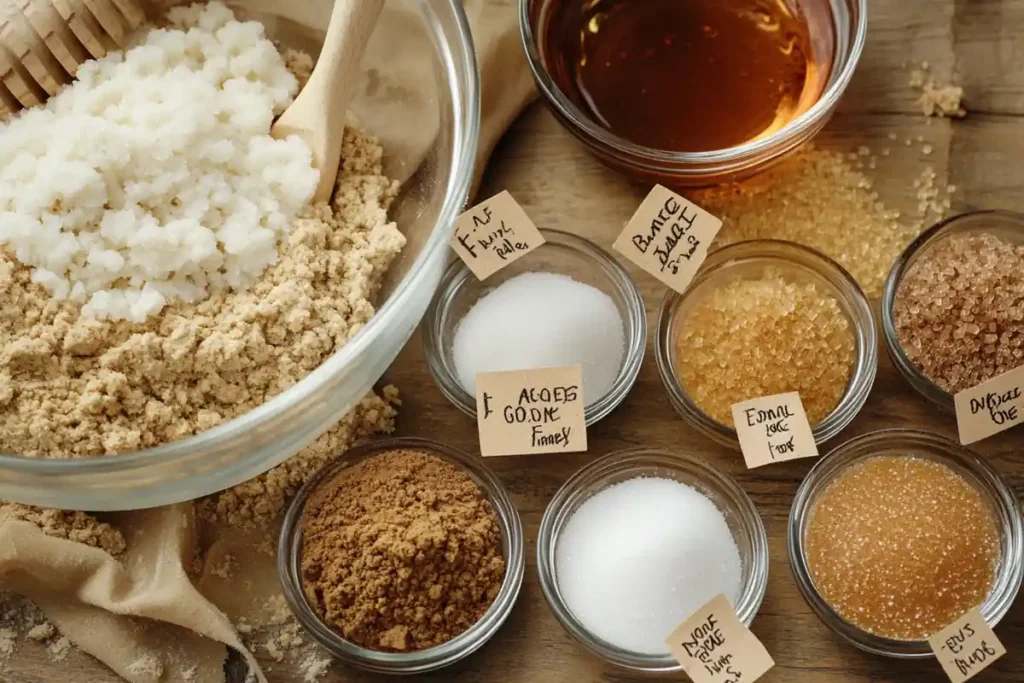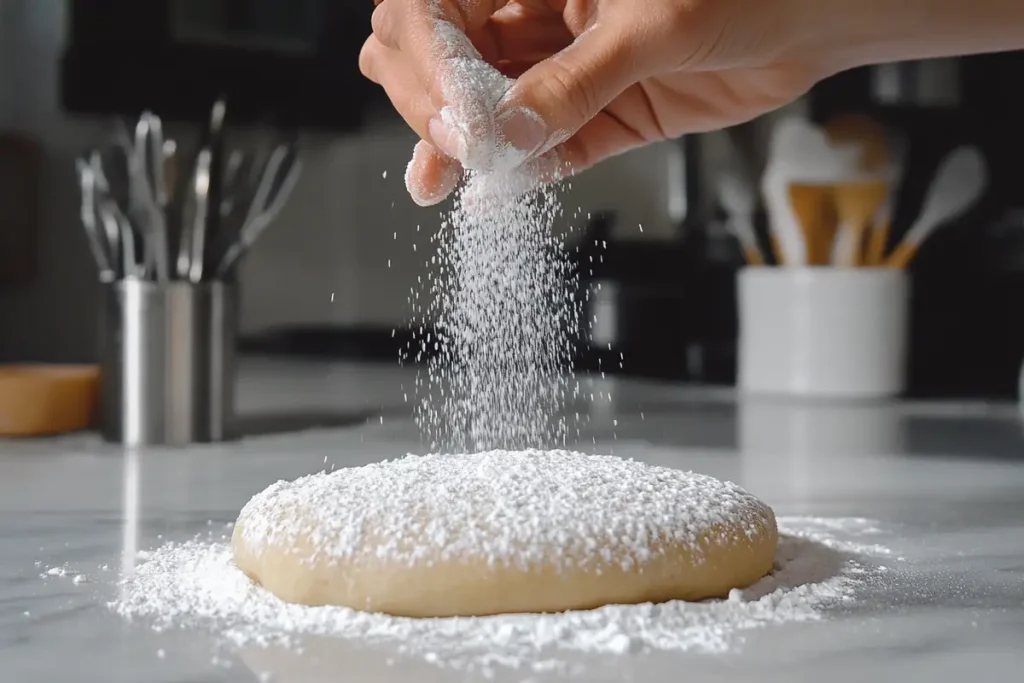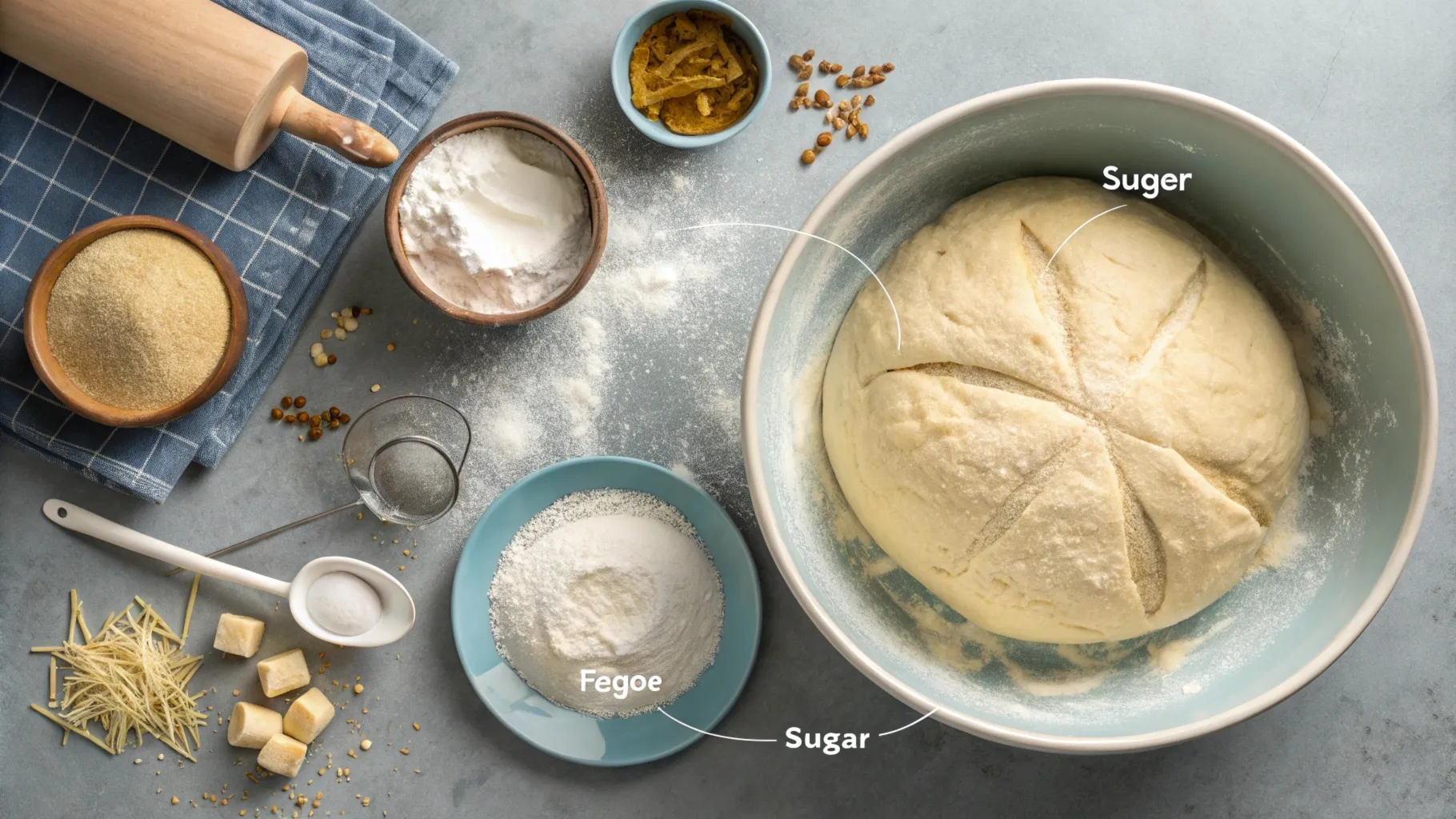Discover if sugar truly helps yeast rise and learn techniques to achieve perfect dough fermentation.
Does sugar cause yeast to rise? Many home bakers ask this question when experimenting with bread dough. Indeed, yeast cells feed on sugars, producing carbon dioxide and making dough airy.
However, understanding how sugar influences yeast goes beyond a simple yes or no. Eventually, by learning how sugar interacts with yeast, you can improve your baking results. Consequently, this article explores the science, techniques, and myths behind sugar and yeast fermentation.
Moreover, it guides you through balancing sugar levels, adjusting recipes, and avoiding pitfalls. Thus, you will gain confidence in controlling dough rise and flavor.
Understanding Yeast and Fermentation
Yeast is a single-celled fungus. Basically, it consumes sugars and releases carbon dioxide and alcohol. This process is fermentation. Eventually, the gas gets trapped in the gluten structure of dough, causing it to puff up.
However, fermentation depends on several factors. Indeed, temperature, moisture, and available sugars all influence yeast efficiency. Another important aspect is that yeast ferments best within a comfortable temperature range and in the presence of nutrients. Consequently, sugar can play a key role, but it is not the only factor.
For more insight into dough challenges, explore What Are the Hardest Breads to Make? and discover why certain recipes test even the most skilled bakers.
Role of Sugar in Yeast Activation
When you wonder does sugar cause yeast to rise?, consider how yeast obtains energy. Yeast breaks down simple sugars to fuel its metabolism. Consequently, providing a small amount of sugar at the start can jump-start fermentation. However, yeast can also break down complex carbohydrates found in flour.
Basically, sugar is like a quick snack that speeds initial activity. Moreover, adding sugar helps yeast multiply faster, producing carbon dioxide more quickly. Nonetheless, moderation is vital. Too much sugar can overwhelm yeast cells or create an environment too concentrated for them to function efficiently.
Types of Sugars and Their Effects

Not all sugars act the same way. For example, granulated white sugar dissolves easily and provides immediate fuel. Brown sugar contains molasses and can add complexity, minerals, and flavor. Honey, molasses, or maple syrup also add moisture and distinct tastes. Eventually, each type of sweetener may influence dough consistency and yeast activity differently. Comparatively, honey’s moisture can soften dough, while molasses brings a darker hue and a richer taste. Consequently, bakers should choose sugars based on desired flavor and texture. Indeed, experimenting with different sweeteners can reveal surprising results.
Curious about why milk is often substituted for water in bread? Learn more in Why Do You Put Milk Instead of Water in Bread? for its role in enriched doughs.
Temperature, pH, and Other Factors
While focusing on does sugar cause yeast to rise?, remember that sugar is not the sole player. Temperature matters greatly. If dough is too cold, yeast works slowly. Conversely, excessive warmth can kill yeast cells. Additionally, pH and salt levels affect yeast performance. Consequently, balancing these conditions ensures yeast thrives. Moreover, proper hydration and kneading help develop gluten networks that trap carbon dioxide. Thus, sugar alone cannot guarantee a good rise. Instead, think of sugar as one puzzle piece among many in successful bread-making.
Common Dough Types and Sugar Levels
Bakers use different dough types, some with minimal sugar and others with higher amounts. For basic white bread, a pinch of sugar helps jump-start yeast. For enriched doughs like brioche or challah, higher sugar content adds sweetness and tenderness. Meanwhile, sweet rolls or pastries rely on more sugar for flavor and caramelization. Indeed, when you ask does sugar cause yeast to rise?, consider your specific dough type. Another point is that certain recipes use sugar primarily for taste rather than yeast activation. Eventually, finding the right balance is key to achieving the best possible rise.
Understanding the Science: Does Sugar Cause Yeast to Rise?
To answer does sugar cause yeast to rise?, look at the underlying science. Yeast consumes sugars to produce carbon dioxide. When sugar is readily available, yeast cells can start working quickly. Eventually, this leads to a noticeable lift in the dough. However, too much sugar can create an environment where yeast struggles. Sugar pulls water away from yeast cells, making it harder for them to function. Consequently, the right amount of sugar fuels yeast but does not drown it in sweetness. Indeed, bakers often add about a teaspoon of sugar to activate yeast in warm water.
Examining Fermentation: Does Sugar Cause Yeast to Rise? (H3)
Considering the fermentation process can clarify does sugar cause yeast to rise? Yeast first consumes simple sugars, releasing gas and creating bubbles. Afterward, as fermentation continues, yeast breaks down starches into simpler sugars. Eventually, even without added sugar, yeast can make dough rise. However, a small amount of added sugar can speed early fermentation, giving you a head start. Nevertheless, if you rely on sugar alone, you might miss the importance of proper temperature, hydration, and gluten development. Thus, sugar is helpful but not a magic solution.
Practical Baking Tips: Does Sugar Cause Yeast to Rise?

When baking at home, consider how does sugar cause yeast to rise? applies to your routine. For example, when proofing yeast, adding a pinch of sugar in warm water can confirm that yeast is active. If the mixture foams, yeast is alive and ready. Additionally, in recipes like cinnamon rolls or donuts, sugar provides flavor and helps dough rise. Conversely, in rustic artisanal breads, bakers often skip sugar entirely. Eventually, understanding your recipe’s goal helps determine sugar usage. Indeed, some bakers experiment with less sugar to highlight wheat flavors.
Adjusting Recipes: Does Sugar Cause Yeast to Rise? (H3)
If you suspect too little or too much sugar affects your dough, you can tweak the formula. Another approach is gradually reducing sugar to see if the dough still rises well. Alternatively, if the dough struggles to rise, add a small amount of sugar next time. Basically, experimenting allows you to discover the ideal sugar level. Consider that does sugar cause yeast to rise? does not have a one-size-fits-all answer. Instead, let your results guide adjustments. Consequently, you gain better control over both flavor and texture.
In recipes like chocolate bread, sugar is crucial for flavor and texture. Learn more in our Delicious and Easy Chocolate Bread Recipe to see sugar’s dual role in activation and sweetness.
Troubleshooting Dough: Does Sugar Cause Yeast to Rise?
At times, dough may fail to rise as expected. If you wonder does sugar cause yeast to rise?, consider whether you added too much or too little. If there is too much sugar, yeast may slow down, leading to a dense loaf. Meanwhile, if there is too little sugar in a sweet bread recipe, the dough may lack flavor or rise more slowly. Another issue could be stale yeast or improper temperature. Nonetheless, sugar often gets the blame. Eventually, by fine-tuning sugar content and ensuring fresh yeast, you can solve many rising problems.
To navigate tough bread recipes and avoid common pitfalls, check out What Are the Hardest Breads to Make? for insights on troubleshooting.
Myths and Facts: Does Sugar Cause Yeast to Rise?
Many misconceptions surround does sugar cause yeast to rise? One myth is that sugar is mandatory for yeast to work. This is not true. Yeast can ferment without added sugar by breaking down flour’s starches. Another myth claims more sugar always equals more rise. In reality, too much sugar can harm yeast. Conversely, moderate sugar helps yeast begin fermentation quickly, but balance remains essential. Eventually, by understanding facts over myths, you can approach baking with greater confidence.
Overuse of Sugar and Its Consequences
While sugar can enhance fermentation, excessive amounts stress yeast cells. Yeast cells need moisture and balance. High sugar concentrations create osmotic pressure, pulling water away from yeast. Consequently, yeast cells become dehydrated, slowing fermentation. This can result in a loaf that takes a very long time to rise or never achieves the desired volume. Thus, if you ask does sugar cause yeast to rise? remember that moderation matters. Pushing sugar levels too high leads to disappointment rather than a perfect loaf.
Health Considerations and Alternatives
Many consumers watch their sugar intake for health reasons. Reducing sugar in bread can yield a more savory flavor and healthier profile. If you worry about does sugar cause yeast to rise?, know that reducing sugar may slow the rise slightly, but not eliminate it. You can also explore sugar substitutes like stevia or erythritol. However, these do not always behave like regular sugar. Another idea is using natural sweeteners like honey or maple syrup in small amounts. Consequently, you maintain some sweetness while still letting yeast do its job.
Testing and Experimentation
Baking is as much science as art. Accordingly, if does sugar cause yeast to rise? intrigues you, experiment. Try making two batches of the same recipe: one with a teaspoon of sugar, another without. Compare the results. Undoubtedly, hands-on testing teaches you how sugar affects your particular dough. Keep notes on rising times, texture, and flavor. Eventually, you will develop intuition about sugar’s role. Because every kitchen is different, personal experience trumps theory. Thus, become a curious baker and find what works best for you.
Cultural and Historical Perspectives
Sugar availability and traditions differ worldwide. Historically, some cultures baked bread without any added sugar. Others developed sweet breads and pastries that rely heavily on sugar. Therefore, when asking does sugar cause yeast to rise?, remember the cultural context. In some European pastries, sugar-rich doughs reflect centuries of tradition. Meanwhile, rustic loaves from other regions remain sugar-free. Consequently, sugar’s role in fermentation is not only scientific but also cultural and historical.
Conclusion
Does sugar cause yeast to rise? In short, sugar can help initiate and speed yeast fermentation, giving dough a quick lift. However, sugar is not absolutely necessary for yeast to function. Flour provides yeast with enough carbohydrates to produce a rise over time. Still, sugar acts like an energy boost, especially at the start. Nevertheless, too much sugar hinders yeast rather than helping. Strive for balance, consider the type of dough, and adjust as needed. Ultimately, sugar is a tool in your baking toolbox, not a magic ingredient. By understanding its effects, you can create breads and pastries that rise beautifully and taste delightful.
Frequently Asked Questions (FAQs)
Does sugar make yeast rise?
Yes, sugar can make yeast rise faster at the start by offering quick energy. However, yeast can also ferment flour’s natural starches. Therefore, sugar is helpful but not mandatory.
Does sugar cause an overgrowth of yeast?
Sugar encourages yeast growth, but it does not cause uncontrolled overgrowth under normal conditions. Yeast’s population grows until it uses available sugars and conditions remain favorable. With balanced sugar, yeast ferments effectively without overwhelming the dough.
Can too much sugar ruin yeast?
Indeed, excessive sugar can stress yeast by creating osmotic pressure. This condition draws moisture away from yeast cells, slowing or halting fermentation. Therefore, moderation is key to preventing yeast inhibition.
Does high sugar cause yeast?
High sugar does not create yeast, but it can influence yeast behavior. When sugar levels are high, yeast may work slower or struggle. Thus, while sugar can spark activity, too much sugar leads to problems.
Looking for more? Check out our other links for even greater insights and inspiration!

